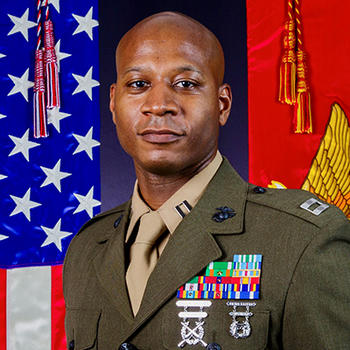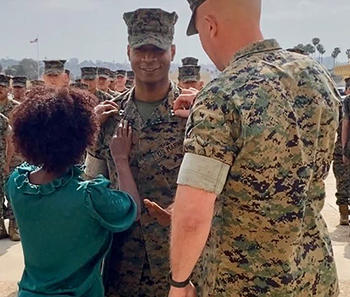Since 2018, the Schar School of Policy and Government at George Mason University has welcomed a cohort of United States Marine Corps officers to campus as Master of Public Policy (MPP) students. The officers chosen for the prestigious Marine Corps Congressional Fellowship Program will complete their fellowships by working for elected representatives on Capitol Hill. Captain Naquan Staton is among the 2024 cohort.
Captain Naquan Staton has a very simple reason for applying to the Marine Corps Congressional Fellowship Program. As a financial management officer, the Charlottesville native sees firsthand how the congressional legislative process directly affects military strategic planning for resource allocation. In short, he wants to be able to do his job more strategically and successfully.

After more than 17 years in the Marine Corps, Staton is back at college for the third time. He earned a BS in business administration from Regent University in 2017 and an MBA from Baylor University in 2021. Now he’s at George Mason’s Schar School studying for a master of public policy degree. He said he appreciates the school’s support to the Marines cohort.
“Beginning with the application process until now, my second semester, the admissions staff, the advisors, the professors, and even the school's dean have provided us with strong academic support, preparing us for our time on Capitol Hill next year,” he said. “It's an honor to undergo such an essential preparation process at George Mason.”
The MPP program has so far delivered what Staton was hoping for when he applied. In particular, the course taught by Adjunct Professor Andrew Pavord called National Budgeting Process fit right in his professional wheelhouse.
“He is an oracle for all things budget,” Staton said. “He did more than teach the students about the federal budgeting process—he went deep into its history, explaining cause and effect from yesterday to today.”
Pavord is an example of the accomplished practitioners who make up much of the adjunct and affiliated Schar School faculty. In addition to teaching at George Mason, Pavord, a former executive at the U.S. Department of the Treasury, is CEO at Federal Consulting Alliance, a Virginia-based, veteran-owned consultancy. He and others on the faculty bring their experience into the Schar School classrooms and provide an extra dimension of learning.

Knowing more about how public policy is developed and deployed is important to Staton who said the appropriations process is the segment of public policy that interests him the most.
“Most policy problems that Congress attempts to solve are solved with money and by appropriation,” he said. “Policy initiatives often come with a price tag, which demands congressional consensus before arriving at the president's desk. So many policy proposals and great ideas flow through Congress. Still, the appropriations pie is only so large, and it's fascinating to see which ideas actually take flight.”
Next year, as he serves on Capitol Hill, Staton will be able to see how the fabled “sausage is made” by legislators and their staffs, and by the end of his Hill tour, he hopes to be well-versed in the congressional culture and understand the key areas of policy, politics, and process.
“It's one thing to have a fundamental understanding of how a bill becomes a law, but until you have been in the kitchen, it's difficult to truly appreciate how the ingredients come together,” he said.
With a regime change in Washington arriving in January, things could be less than normal in official Washington for the Marine Corps fellows, but Staton isn’t concerned.
“I believe every Marine's best attribute is composure under chaos,” he said. “We are taught to be flexible, fast, and to constantly consider all risks to the mission. Being somewhat aware of how high-tempo the halls of Congress are, I'm confident any Marine Fellows will thrive.”
More than 4,700 of George Mason’s more than 40,000 students are military or veteran-connected. The university is designated a Military Friendly TM institution and has been rated as a top college for veterans by U.S. News and World Report. In fall 2024, the university’s incoming freshman transfer cohort was 20 percent military connected, and the incoming graduate cohort was 19 percent military connected. See this webpage to learn about the Military, Veterans, and Families Initiative at George Mason.
